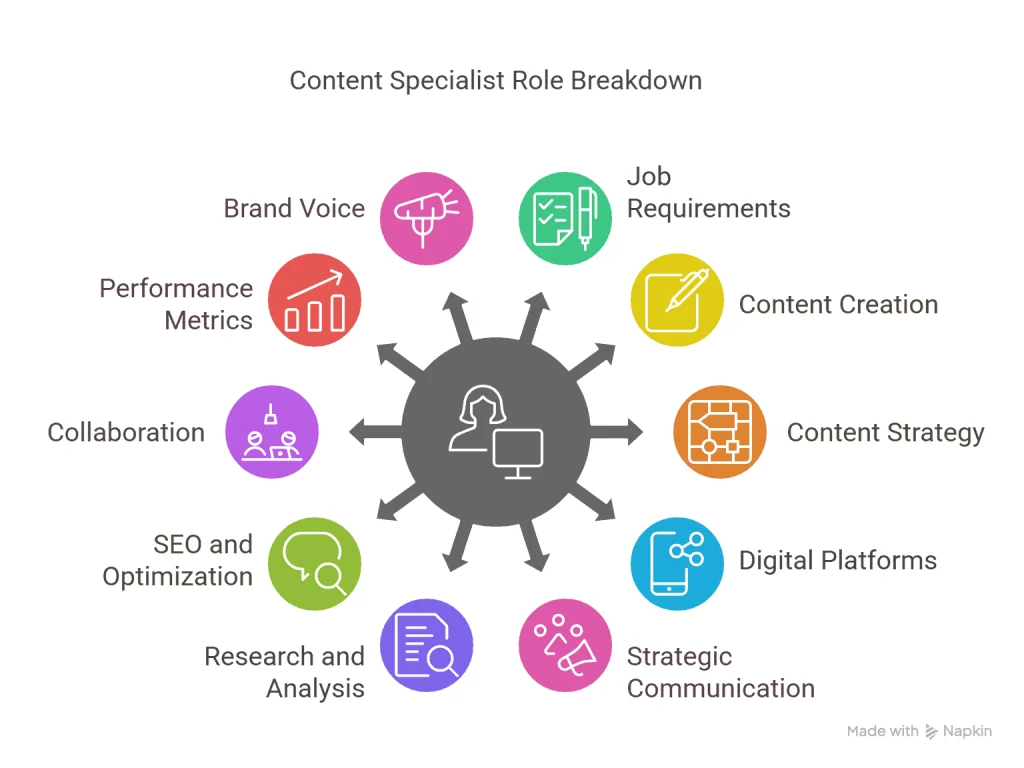As the digital landscape evolves, The Journey of a Content Specialist: Understanding the role of a content specialist becomes increasingly pivotal. With a staggering 80% of businesses acknowledging content strategy as critical to their success, it’s no surprise that this role is gaining prominence. According to an industry expert, “A content specialist focuses on creating, managing, and optimizing content strategies,” which underscores the strategic insight and brand alignment essential for this role. On Quora, a popular discussion reveals the primary role of a content specialist is to ingeniously weave narrative architecture into engaging content, making them indispensable to modern marketing efforts.
Delving into the daily responsibilities, it’s evident that strong writing and editing skills form the backbone of a content specialist’s toolkit. On Reddit, practitioners highlight that collaboration and creativity are key components for thriving in this position. This requirement for diverse capabilities marks the content specialist as both a valuable communicator and a critical thinker, allowing them to identify content strategy differences from content strategists. As brands increasingly strive for cohesive digital narratives, the powerhouse role of content specialists will only continue to grow.

Understanding the Role of a Content Specialist
The role of a content specialist is crucial in today’s evolving digital environment, focusing primarily on crafting and optimizing content strategies that align with business goals. As content marketing specialists, they master content creation and narrative architecture. A pivotal distinction between content specialists and strategists is highlighted by their hand -on application and execution of content as opposed to overarching planning. It’s significant to note that 80% of businesses recognize effective content strategy as vital for success, showing the increasing demand for individuals in this role.
Responsibilities of a Content Specialist
The daily responsibilities of a content specialist encompass crafting engaging content, managing content workflows, and maintaining alignment with brand strategy. Essential tasks include writing, editing, and collaborating with cross-functional teams to enhance content effectiveness. Strong writing and editing skills form the foundation for achieving these responsibilities, along with creative collaboration. Professionals emphasize the necessity for creativity and teamwork, underscoring the dynamic nature of the content specialist’s role.
Job Requirements and Skills
Content specialists require a robust set of qualifications and skills to thrive in their roles. Firstly, strong writing and editing skills are deemed essential. Professionals in this field must possess an exceptional command of language to craft compelling content and convey messages effectively. Additionally, they need to be adept at understanding and implementing brand voice and identity.
Furthermore, technical skills such as SEO knowledge and expertise with content management systems are crucial. With 78% of companies actively looking for specialists with SEO expertise, the ability to optimize content for search engines is a significant advantage. These skills ensure that content reaches a wider audience and adheres to best practices for digital visibility.
Essential Technical Skills
In today’s digital landscape, content specialists must have proficiency in various technical tools. Knowledge of analytics tools is indispensable, as these facilitate the analysis of content performance and audience engagement. Familiarity with automation tools also plays a pivotal role in streamlining content workflows and increasing productivity.
Moreover, understanding SEO principles and the ability to utilize SEO strategies effectively is necessary. This technical proficiency aids in enhancing content relevance and achieving higher search engine rankings. As highlighted by industry experts, staying updated with the latest SEO trends is vital for maintaining content competitiveness.
Content Creation and Management
Effective content creation and management consist of several procedural steps that ensure the quality, relevancy, and strategic alignment of content. Here are four crucial steps:
- Conduct thorough research to inform content creation, ensuring all materials are accurate and relevant to the desired audience. This involves using analytics to understand audience preferences and trends.
- Develop an editorial calendar to plan, schedule, and track content across different platforms. Editorial calendars are tools that assist in maintaining consistent and timely content delivery, thereby optimizing audience engagement.
- Employ SEO and data analytics to enhance content visibility and performance. SEO strategies form a crucial part of content creation, helping content reach a wider audience and improve its search engine ranking.
- Use content management systems (CMS) to efficiently develop, publish, and manage content. Mastery of CMS is vital as it streamlines the content management process, ensuring that all output aligns with strategic objectives and is accessible to the target audience.
Developing Content Strategy
Developing a robust content strategy involves three key steps: identifying audience needs, aligning with business goals, and defining content distribution practices. These steps establish a blueprint that guides the entire content lifecycle, ensuring that content is purposeful and impactful.
- Identify Audience Needs: Understanding the preferences and requirements of your target audience is the cornerstone of a successful content strategy. This involves conducting thorough market research and utilizing tools for audience insights.
- Align with Business Goals: Ensuring the content strategy aligns with the overarching business goals enhances the coherence and impact of the messaging.
- Define Content Distribution Practices: Planning how and where content will be distributed is vital for reaching the intended audience. This includes choosing the appropriate digital and traditional platforms and leveraging technologies like SEO optimization tools.
Digital and Traditional Platforms
In today’s content landscape, digital and traditional platforms serve as crucial conduits for reaching diverse audiences. Digital media, characterized by platforms such as social media and websites, offers interactive features and instantaneous communication. This interactivity requires technical agility but allows for a more dynamic engagement with audiences. In contrast, traditional media, including print and broadcast, provides a certain gravitas and perceived credibility inherent in established formats.
Choosing the Right Media for Content Specialist
Choosing the appropriate media for content dissemination hinges on understanding the target audience’s media consumption patterns. Digital platforms are pivotal for real-time interaction and measurable outcomes, making them suitable for audience-driven content. On the other hand, traditional media excels in instilling trust and driving long-term brand loyalty.
Storytelling plays a vital role in media selection. Effective storytelling, whether through a compelling video or a detailed article, captures audience attention and fosters a deeper connection, regardless of the platform.
Strategic Communication Goals
Aligning content with business communication objectives is crucial for achieving strategic goals. A content specialist must ensure that all content efforts are strategically aligned with the organization’s overarching objectives. This alignment not only enhances content efficacy but also facilitates clearer messaging that resonates with target audiences.
Setting and measuring key performance indicators (KPIs) are essential for tracking success and identifying areas needing improvement. By integrating KPI measurements into the communication strategy, businesses can drive growth effectively.
Setting Communication Benchmarks
Establishing communication benchmarks involves defining clear, measurable standards that serve as a reference point for evaluating content effectiveness. Setting the right benchmarks ensures that the communication strategy is on track to meet its objectives.
Research and Trend Analysis
In today’s fast-paced digital landscape, content specialists must engage in comprehensive research and trend analysis to remain relevant. Understanding the current trends and consumer preferences is paramount for crafting effective content strategies.
Leveraging data-driven decision-making processes enables content specialists to spot emerging trends and adjust strategies accordingly.
Tools for Trend Analysis
Content specialists can utilize various analytical tools to conduct effective trend analysis. Popular tools such as Google Trends and BuzzSumo are instrumental in tracking market movements and understanding consumer behavior.
Content Strategies
Developing robust content strategies is essential for content specialists to deliver maximum impact and engagement. Content strategies provide a structured approach to creating, managing, and distributing content across various platforms.
Distribution Channels
Selecting the right distribution channels is crucial for enhancing content reach and impact. Platforms such as social media, email, and blogging are common practices for content specialists to leverage.
SEO and Optimization
SEO and optimization are critical components in enhancing content visibility and driving engagement with the target audience. Utilizing advanced SEO strategies ensures that content is not only discoverable by search engines but also resonates well with user intent.
SEO Techniques
Effective SEO involves several key techniques that enhance content visibility:
- Keyword Research: Identifying and integrating relevant keywords that align with user search intent is paramount.
- On-page Optimization: This includes optimizing meta tags, headers, and URLs to ensure they are descriptive and keyword-focused.
- Quality Content Creation: Crafting engaging, informative, and original content that provides value to the audience encourages longer site visits.
- Link Building: Building a network of quality backlinks from reputable sites enhances domain authority.
Collaboration with Teams
Effective collaboration with teams is integral for content specialists striving to achieve cohesive content strategies. By working closely with marketing and design teams, content specialists ensure that all elements of a campaign align seamlessly.
Integrating Marketing and Content
Integrating content strategies with marketing plans is crucial for a cohesive approach. Methods such as aligning content calendars with marketing schedules and synchronizing messaging across platforms ensure that the content supports broader marketing objectives.
Content Performance Metrics
Evaluating content performance is essential for understanding a campaign’s effectiveness. Content metrics provide vital insights into how well content is engaging target audiences and aligning with business objectives.
Key Performance Indicators
Key Performance Indicators (KPIs) are critical for measuring content success. KPIs such as organic traffic, bounce rate, and social media engagement are pivotal for assessing a content strategy’s impact.
Brand Voice and Identity
In the bustling realm of content creation, establishing a compelling brand voice is akin to crafting a masterpiece that speaks volumes over digital soundwaves. Creating content that resonates with the audience starts with understanding the brand’s core values and mission.
Crafting Brand Stories
Crafting authentic brand stories is a delicate balance of creativity and strategy. These narratives not only reflect the brand’s values but also engage audiences on a deeper level.
Content Formats
Understanding the different content formats is crucial for a content specialist looking to engage diverse audiences across platforms. A versatile approach allows the creation of tailored content for blogs, social media, websites, and print media, each with its unique set of advantages.
Advantages of Diverse Formats
Diverse content formats allow for broader reach and deeper audience engagement. For example, while blogs provide detailed insights, social media offers quick interactions with real-time feedback.
Audience Engagement
In today’s digital landscape, capturing and maintaining audience attention is crucial. Engaging content leverages storytelling to create emotional connections, encouraging not just consumption but interaction as well.
Interactive Content Techniques
Creating content that fosters interaction not only enhances user engagement but also builds a more dynamic connection with your audience. Techniques such as polls and quizzes seamlessly integrate into content strategies to invite participation.
Career Path and Opportunities
The career path for a content specialist is marked by diverse opportunities that cater to various interests and skill sets. Initially, content specialists focus on honing their writing and editing skills, which are essential for creating compelling content. Over time, they may transition into roles such as content strategists, where they oversee content direction, aligning it with broader business objectives.
Transitioning into Content Roles
Transitioning into content roles can be a seamless process with the right focus on skill development. Prospective content specialists should immerse themselves in content creation and editing, while also grasping SEO fundamentals to enhance their profile.
Industry Applications
Content specialists play pivotal roles in various industries, each with unique demands and expectations. Understanding these sector-specific roles can help tailor content strategies effectively to different organizational goals and audience needs.
Cross-Industry Insights
Gaining insights from cross-industry roles enhances a content specialist’s adaptability and strategic thinking.
Creative and Writing Skills
- Storytelling: Crafting engaging narratives is vital for capturing and maintaining audience interest.
- Editing and Proofreading: Ensuring content accuracy and consistency through meticulous editing and proofreading is essential.
- Originality: Developing unique content ideas and perspectives is crucial in standing out in a crowded digital landscape.
- Visual Design Integration: Combining written content with visual elements enhances overall impact.
- Adaptive Writing Styles: The ability to switch writing styles to suit different platforms and audience preferences ensures effective communication.
Strategic Placement of Content
Strategic placement of content is a key factor in maximizing its impact and visibility across various platforms. By analyzing audience behavior and platform algorithms, content specialists can ensure that content reaches the desired audience effectively.
Content Performance Adjustment
For effective content performance adjustment, evaluating current strategies and their results is crucial. By continuously analyzing performance metrics, content specialists can identify areas of improvement.
Monitoring and Adjusting Strategies
Monitoring strategies involves regular performance reviews to track engagement and audience response. Effective techniques include using A/B testing to compare content variations and assess impact.
Driving Traffic and Engagement
The Journey of a Content Specialist
To achieve thriving traffic and engagement, content specialists employ strategic techniques, blending creativity with data analysis. Leveraging SEO optimizations boosts web visibility, whether through strategic keyword placement or crafting reader-centric content.
Contributing to Organizational Success
Content plays a pivotal role in driving organizational success by aligning with key business goals. By creating strategies that reflect business objectives, content specialists ensure that every piece of content contributes to broader organizational aspirations.
Integrating Content with Business Goals
Aligning content strategies with business objectives ensures consistency in messaging and purpose. Content specialists work closely with management to understand and reflect strategic business plans in their content, maximizing impact.
FAQs
What does a content specialist do?
A content specialist is responsible for creating, managing, and optimizing content strategies that align with a company’s business objectives.
How much do content specialists make in the US?
The salary of a content specialist in the US can vary widely based on experience, location, and the specific industry. On average, content specialists can expect to earn between $40,000 and $70,000 annually.
What is another name for a content specialist?
A content specialist is often referred to by various titles such as Content Marketing Specialist, Digital Content Creator, Content Strategist, or Editorial Specialist.
What is the role of a content quality specialist?
A content quality specialist focuses on ensuring that content meets the highest standards of quality and aligns with brand guidelines.
How do I become a content specialist?
To become a content specialist, one typically needs a background in communications, English, marketing, or a related field, coupled with strong writing and editing skills.
Conclusion
The role of a content specialist is multifaceted, demanding a nuanced understanding of digital media landscapes and strategic content deployment. By focusing on creating, managing, and optimizing content, these professionals play a pivotal role in aligning content strategies with business objectives to enhance brand visibility and customer engagement.


 Owner of Write Remotely. Connecting businesses with talented writers and empowering remote work.
Owner of Write Remotely. Connecting businesses with talented writers and empowering remote work. 

